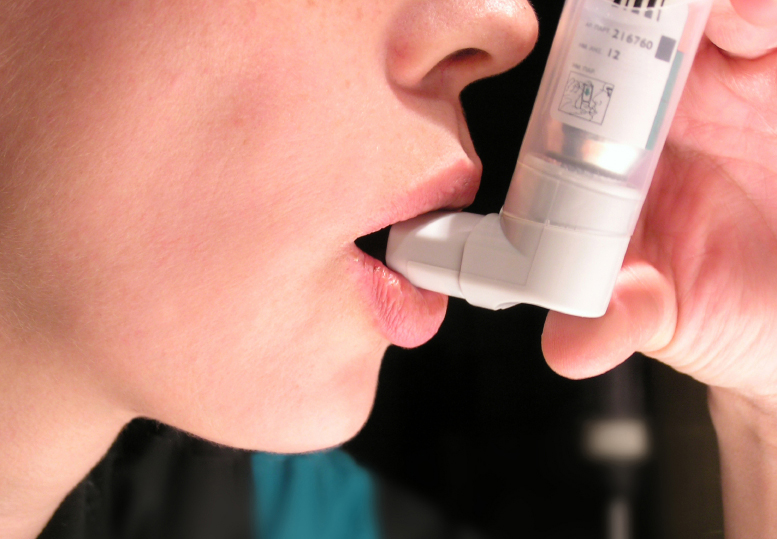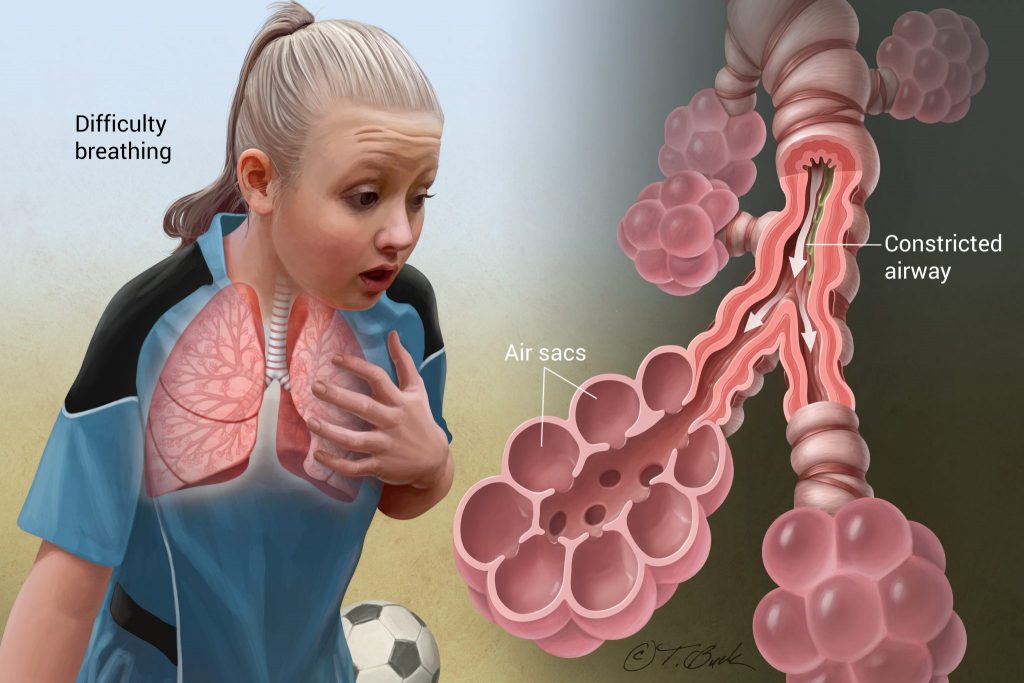Asthma is a chronic disease that occurs when your airways swell, narrow, and produce extra mucus. The swelling increases your airways’ susceptibility to an allergic reaction and makes them extremely sensitive to irritations. The condition makes breathing difficult and triggers wheezing coughing or shortness of breath. Asthma can be a minor nuisance or a major problem that makes physical activities impossible. There is currently no cure to treat asthma, but there are management methods to help control the symptoms so you can lead an active life.

The symptoms of asthma can be different from one person to another. Some people only experience the symptoms at certain times, others have symptoms all the time. The common signs and symptoms of asthma include:
- Coughing, particularly when laughing, at night, or during exercise
- Shortness of breath
- Pain or tightness in the chess
- A wheezing or whistling sound when breathing
- Fatigue
Your asthma can worsen over time if you don’t do anything to control it. Signs to identify when your asthma is getting worse are:
- Needing to frequently use a quick-relief inhaler
- Increasing difficulty breathing
- Asthma symptoms that are more bothersome and frequent

Certain situations can flare up the symptoms, depending on the type of asthma you have. The types of asthma include:
- Occupational asthma, which is caused by workplace irritants, such as gases, chemical fumes, and dust
- Exercise-induced asthma, triggered by cold and dry air
- Allergy-induced asthma (extrinsic asthma), happens when there are airborne substances in your environment, such as mold spores, pollen, etc.
- Nonallergic asthma (intrinsic asthma), trigged by irritants in the air that are not related to allergies, such as cold air, viral illnesses, perfumes, air fresheners, and air pollution
- Cough-variant asthma (CVA) doesn’t have any classic asthma symptoms such as shortness of breath or wheezing. It is characterized by a dry cough that persists.
- Nocturnal asthma gets worse at night. It is thought that nocturnal asthma is triggered by the body’s natural sleep cycle.
The reason why some people have asthma is still unclear, but researchers believe that it is caused by a combination of genetic and environmental factors. These factors include:
- Genetics. Asthma can be inherited by your parents who suffer from the condition.
- Exposure to an allergen. Frequent contact with possible irritants and allergens can increase your chance of developing asthma.
- Viral infection history. If you have a history of viral history during childhood, you’re more likely to develop asthma.
- Hygiene hypothesis. According to this hypothesis, babies are not exposed to enough bacteria in their early years, so their immune systems don’t become strong enough to fight certain medical conditions, including asthma.
Besides the risk factors, certain conditions can also trigger symptoms or asthma attacks. The triggers are:
- Exercise can make breathing more difficult
- Respiratory illness, such as pneumonia and the flu can trigger asthma attacks
- Allergens, including dust mites, pollen, and animal dander
- Irritants in the air, such as chemical fumes, smoke, and strong odors
- Extreme weather, such as very low temperatures or very high humidity
- Emotions, including laughing, crying, and shouting, or stress
- Certain medications, including aspirin, ibuprofen, naproxen, and beta-blockers
- Preservatives and Sulfites in some types of foods and beverages, such as dried fruit, shrimp, wine, and beer
- Gastroesophageal reflux disease (GERD), which is a condition where stomach acids back up into the throat.
If you have severe asthma attacks, you will need to be taken to an emergency room or hospitalized. In severe cases, the signs and symptoms can interfere with your daily life, such as sleep, work, or school. Since the exact cause of asthma is still unidentified, there is no way to prevent the condition. Fortunately, preventing asthma attacks is possible. You and your doctor can make a step-by-step plan, which usually involves:
- Get vaccinated for pneumonia and influenza can help keep away asthma flare-ups.
- Get allergy shots to help alter your immune systems. Routine allergy shots can make your body become less sensitive to triggers.
- Avoid triggers, such as chemicals or products that cause breathing problems.
- Identify your attacks and act quickly to decrease your risk of experiencing severe attacks.
- Pay attention to your quick-relief inhaler usage, if you need it frequently, your asthma is not under control.
- Take your medication as prescribed even when the symptoms seem to be improving.
Besides the prevention of asthma attacks, there are also some treatments to improve the symptoms. The treatments involve three categories, breathing exercises, first aid treatments, and long-term medications. Your doctor will decide which treatment is right for you, or the best combination of treatment based on your age, triggers, and the type of asthma you have.
Breathing exercises are aimed to help you get more air in and out of your lungs. This exercise may help increase your lung capacity and even cut down severe asthma symptoms. With first aid treatments, your doctor will give you medication that should only be used when you experience an asthma attack. First aid treatments provide quick relief to help you breathe and often include recuse inhalers, anti-inflammatories, and bronchodilators. If your doctor prescribes you long-term asthma control medications, you may need to take it daily to prevent symptoms.
Although over-the-counter medicines and alternative remedies aren’t recommended to treat asthma, some home remedies can help stop symptoms from intensifying. However, it is advisable to ask your doctor first before trying these home remedies.
- Essential oils, such as eucalyptus, lavender, and basil essential oils, may ease breathing difficulties. However, it may not be good for some individuals because strong smells can trigger asthma and worsen the symptoms.
- Caffeinated tea or coffee has a chemical that acts similarly to theophylline (a type of asthma drug). This chemical opens up your airways and may temporarily ease asthma symptoms.
Staying healthy and taking care of yourself can also keep the symptoms under control. Having asthma is not an excuse to be less active. Regular exercise is known to strengthen the heart and lungs, which can help relieve asthma symptoms. Maintaining a healthy weight can also help because being overweight can worsen asthma symptoms.